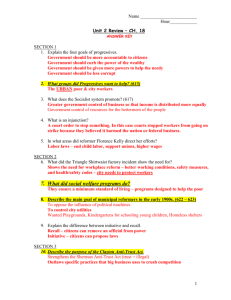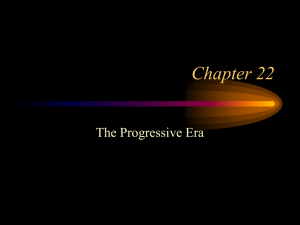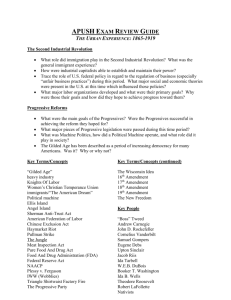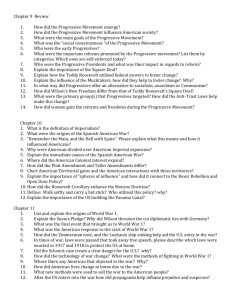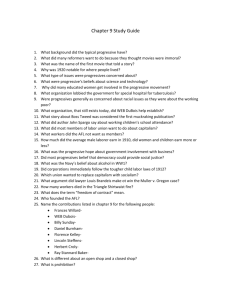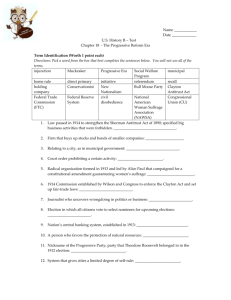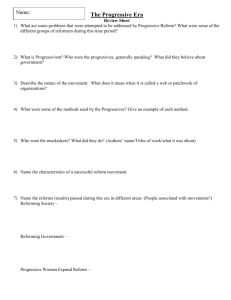JB APUSH Unit VB - jbapamh
advertisement
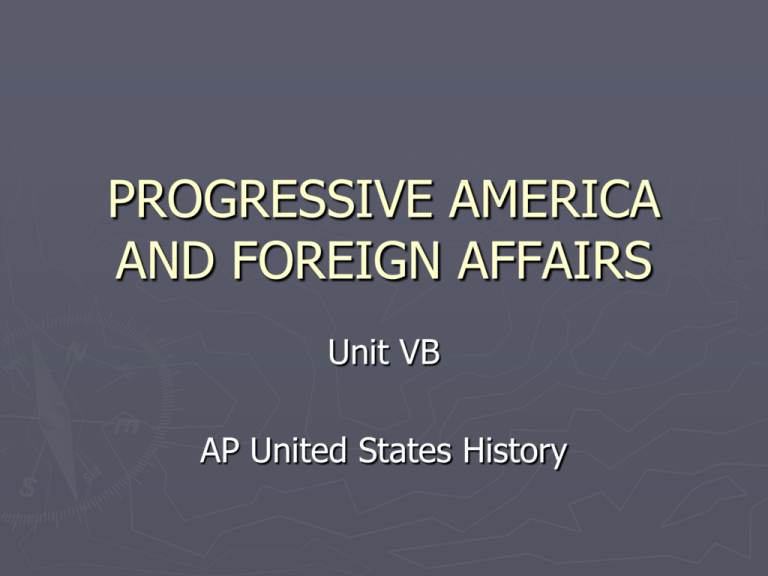
PROGRESSIVE AMERICA AND FOREIGN AFFAIRS Unit VB AP United States History Fundamental Questions ► To what extent was the progressive movement “progressive”? ► To what extent was the American public supportive of increased foreign involvement? Solving the Problems of the Gilded Age ► Massive industrialization, production, and urbanization led to a wide variety of issues and problems or an expanding of existing concerns Political ineptitude Social inequalities Economical gaps Culture clashes ► Certain individuals and groups strongly pursued causes to improve America’s conditions and led the way for further government intervention Progressivism (1900-1920) ► Reformers destined to solve the many issues through a pragmatic approach Experiment for improvement ► Most Progressives came from the urban middle- class ► Progressives charged with Christian values and morality ► American ideals seemed antiquated and needed changes or modifications The American character should change/evolve with society Development of Progressives ► ► Industrialization, commercialism, and urbanization exacerbated social, political, and economic problems and issues Expansion of the middle-class who were educated and understood the conditions Whereas upper-class preferred status quo and lower-class enveloped in conditions ► ► ► ► ► Laissez-faire and limited government proved ineffective and socialism and anarchism proved too radical Inspired by Social Gospel and Gospel of Wealth to solve problems affecting society through promotion of Christian values Fueled by historic idealistic pursuits such as Jeffersonianism, Jacksonian democracy, and Populism Initiatives and referendums at municipal and state levels spread notice of issues in hopes of making them national Use of scientific research and statistics supported Progressive initiatives to justify and reason for change/modification Progressives and Democracy ► Promotion of democracy by pursuing policies and initiatives to expand the people’s voice In order to limit the corruption and influence of patronage, political machines, and big business ► Secret ballots (Australian ballot) Polling places inundated with corrupt tactics All candidates printed on ballots Vote in privacy at assigned polling place ► Direct primaries Eliminate practice of electing candidates through political bosses Not thoroughly effective ► Direct election of Senators Eliminate patronage practice with state legislators selecting candidates Seventeenth Amendment (1913) Most Southern states did not ratify due to belief in limiting states’ rights ► Initiatives, referendums, and recalls Way of persuading legislatures to seriously consider and adhere to issues Progressive Social Initiatives and Developments ► Settlement Houses and YMCA From idealistic reformers to professional social workers Provide shelters, constructive leisure activities, education Hull House in Chicago and Jane Addams ► Blue Laws Regulating morality at the local and state levels ► Temperance to Prohibition Support for prohibition more from rural reformers than urban reformers Eighteenth Amendment (1919) and Volsteadt Act prohibited manufacturing and sale of alcohol ► Education Comprehensive and compulsory education Teachers based on merit and professionalism Educational reform varied from location ► Labor Unions AFL worked better for labor reforms ► Workers’ compensation, minimum wages, improved conditions Industrial Workers of the World (IWW) aka Wobblies ► ► Direct action use of general strikes Socialists, anarchists, immigrants Progressives and Minorities ► Blacks and Civil Rights Whether exploited through sharecropping or publicly segregated, blacks suffered inequities and Progressives tended to ignore their plight By 1900, 90% blacks in South; Great Migration to cities and the North ► National Urban League (1911) W.E.B Du Bois – demand for civil rights for progress Booker T. Washington – economic opportunity for progress ► ► President of Tuskegee University Up From Slavery and White House dinner Niagara Movement to NAACP (1908) ► Women’s Suffrage Movement Younger women rose up for women reform and suffrage Suffrage gains at the state levels and changed to national suffrage movement National American Woman Suffrage Association (NAWSA) (1900) – Carrie Catt Stronger tactics – Alice Paul and Lucy Burns AND National Women’s Party (NWP, 1916) ► ► Picketing, parades, hunger strikes Silent Sentinels Nineteenth Amendment (1920) ► League of Women Voters for female efficacy Internal Migration Suffrage by States Muckrakers ► ► ► ► ► ► Journalists and authors investigated and probed the “dirty side” of politics, economics, and society by combining research with sensationalism Originated with attacks on the Standard Oil Company Targets included: monopolies/trusts (steel, oil), corporations (railroads), political bosses and machines, poor living and working conditions (tenements) Informed public and aroused feelings against corruption and poor conditions Led to more and new government regulations and enforcement; development of public relations by businesses Upton Sinclair’s The Jungle Local Political Reform ► Political bosses and local businesses forged corrupt allegiances ► Cities asserted more control and regulation of public utilities ► Commissioners and city councils popularly elected; city managers ► Progressive mayors: Toledo’s Samuel Jones and Cleveland’s Tom Johnson State Political Reform ► More and more states assumed progressive reforms Direct primaries, business regulations, tax reforms, suffrage, temperance ► Wisconsin’s Robert LaFollette’s “Wisconsin Idea” ► As more states became progressive, reformers began to pursue initiatives on a national level Roosevelt and Progressives (19011908) ► Square Deal Favored fairness and national welfare Domestic “Big-Stick” ► Trust-Busting Enforce Sherman Anti-Trust Act Good trusts and bad trusts ► National Regulation Elkins Act and Hepburn Act strengthened ICC over railroads Pure Food and Drug Act Meat Inspection Act ► Conservation Forest Reserve Act Newlands Reclamation Act Gifford Pinchot and National Conservation Commission National Parks Taft and the Progressives (19081912) ► Trust-busted more than Roosevelt ► Set aside lands for conservation ► Mann-Elkins Act ► Sixteenth Amendment Election of 1912 ► Taft’s policies lead to a split in the Republican Party Conservative Republicans and Progressive Republicans (Insurgents) ► Bull Moose Party and Roosevelt New Nationalism – executive regulations of industries and social justice ► Democrat Woodrow Wilson New Freedom – regulate business but promote competition and small businesses ► Socialist Party of America and Eugene V. Debs Radical reforms ► Woodrow Wilson defeated Roosevelt as the Republicans were split Election 1912 Woodrow Wilson and Progressives (1912-1920) ► ► ► ► ► Business Regulation Clayton Antitrust Act Federal Trade Commission ► Regulate unfair practices in most industries Federal Reserve Banks’ bank Federal Reserve Board dictated monetary policy 12 national financial districts Federal Farm Loan Act Low interest loans from federal banks Child Labor Act (1916) Prohibited interstate shipment of products made with children under 14 Found unconstitutional Underwood Tariff Lowered tariffs and increased income tax U.S. Foreign Events Before 1880 ► Monroe Doctrine ► Japan Commodore Perry Convention of Kanagawa (1854) ► William H. Seward Mexico (1866) Midway Island (1867) Alaska Purchase - “Seward’s Folly” (1867) Hawaii ► ► ► Hawaii was an independent kingdom Christian missionaries and sugar plantation farmers settle since 1820s Rise of Sugar Oligarchy and Fall of Kingdom Duty-free sugar led to sugar plantation owners become prosperous and powerful Queen Liliuokalani resented American encroachment Sugar owners back by marines overthrew the Queen and established Republic of Hawaii ► Annexation Grover Cleveland refused William McKinley argued manifest destiny Annexed in 1898 and territory by 1900 Why Hawaii? Enforcing the Monroe Doctrine ► Pan-American Conference (1889) Permanent organization between U.S. and Latin American nations for mutual political and economical prosperity ► Venezuela and Great Britain U.S. threatened force against Britain Deal made favoring U.S. and G.B. Spanish-American War ► Cuba Cuban revolt and Spanish retribution threatened American investments ► Yellow journalism Sensational stories whipped up anti-Spanish sentiment ► DeLome Letter (Feb. 9, 1898) Spanish minister criticized McKinley ► “Remember the Maine!” (Feb. 15, 1898) 250 Americans lost in explosion in Havana Harbor ► War declaration and Teller Amendment Spain’s refusal of American demands led to war Teller Amendment promised Cuban independence once peace restored ► Cuban Theater Inexperienced soldiers died from disease than Spanish Rough Riders and San Juan Hill Santiago Bay ► Philippines Theater Destruction of Spanish fleet in Manila Bay (May 1, 1898) Americans capture Manila (August 13, 1898) ► Treaty of Paris Cuban independence Annexation of Puerto Rico, Guam; Philippines for $20 million A Cry for War Imperialists and Anti-Imperialists ► ► ► ► Mostly from Republican Party Theodore Roosevelt, John Hay, James G. Blaine Economic expansion, political security, international prestige, humanitarian efforts Insular Cases (1901-1903) Constitutional provisions and guarantees granted only by Congress to territories ► Anti-Imperialist League ► William Jennings Bryan, Samuel Gompers, Mark Twain, Ben Tillman, Andrew Carnegie ► Mostly from Democratic Party ► Undemocratic, violated republicanism Big Stick by Teddy Policies of Diplomacy ► Big Stick Policy (Roosevelt 1901-1908) Aggressive and interventionist policies Roosevelt Corollary ► Right for American intervention if a nation proved incapable to protect American investments and hemisphere stability ► Dollar Diplomacy (Taft 1909-1912) Endorse American expansion through overseas investment and infrastructure Lodge Corollary extended Monroe Doctrine to non-European nations ► Moral Diplomacy (Wilson 1912-1921) Opposition to aggressive expansion Promote democratic and republican ideals especially in affected nations/territories Intervention in Latin America ► Cuba Platt Amendment ► Removal of U.S. troops on acceptance ► Became a U.S. protectorate ► ► ► Haiti (BSP) Santo Domingo (BSP) Panama (BSP) Revolution and Hay-Pauncefote Treaty ► After U.S.-supported rebellion, U.S. awarded rights to canal zone connecting Atlantic and Pacific interests Panama Canal ► 1904-1914 ► Eliminated American ► exemption in 1914 (MD) Nicaragua (1911) (DD) Marines sent to protect investments ► Puerto Rico Limited sovereignty and citizenship in 1917 (MD) ► Mexico Tampico and Pancho Villa (1913-1917) Panama Canal Zone Caribbean Involvement Intervention in Asia ► Philippines Annexed by Treaty of Paris (1899) Guerilla warfare led by Emilio Aguinaldo Jones Act of 1916 (MD) ► ► Guaranteed rights and independence given stability China Open Door Policy ► ► Equal trading among nations with spheres of influence in order to protect American investments in China Preserve Chinese independence for mutual benefit Boxer Rebellion ► ► International force suppressed anti-foreigner rebels Europeans further strangled Qing Dynasty Railroad investment in China (DD) ► Japan Treaty of Portsmouth ► Ended Russo-Japanese War “gentleman’s agreement” ► Japanese restrict emigration and U.S. repeal discrimination laws Great White Fleet (1907-1909) (BSP) Root-Takahira Agreement (1908) ► ► Japan supported Open Door Policy in China Acknowledged each nation’s territories in Pacific Great War in Europe (1914-1919) ► Archduke and wife of Austria-Hungary assassinated by Serbian nationalist on June 28, 1914 ► Alliances and ultimatums dragged Europe into a destructive conflict American Neutrality and Opinion ► Wilson proclaims neutrality on August 4, 1914 ► Economic prosperity key to American progress and continue trade with both sides ► American ships seized by British and sunk by Germans violating freedom of the seas ► American loans toward Allies ► American public and American and British press favored Allies while depicting Central Powers as brutal aggressors ► Ethnic opinions based on nation’s allegiance ► Populists, Progressives, William Jennings Bryan, Socialists, Midwest, West, women, Jane Addams opposed becoming more involved in war Toward American Involvement ► German U-Boats Lusitania sunk on May 7, 1915 killing 128 Americans Sussex in March 1916 Wilson threatened sanctions and Germany promised to abide by freedom of the seas ► National Security League Preparedness by developing and increasing military during 1915-1917 ► ► ► Unrestricted submarine warfare by Germany Russian Revolution Zimmermann Telegram German request for Mexico alliance in return for lost land by U.S. ► Wilson requested declaration of war by Congress against Germany Given on April 6, 1917 by near unanimous vote American Home Front ► War agencies War Industries Board – prioritized production, limited use of resources, set prices Food Administration – rationing of food National War Labor Board – union concessions, no strikes ► Liberty Bonds Americans purchase government bonds to finance war ► Committee on Public Information Provide a pro-Allies perspective in the newspapers, arts, literature, theaters, music ► American Protective League Prejudice-based propaganda, especially against Germans ► Espionage Act of 1917 Prohibit interference in military and obstruct the draft Schenck v. United States upheld; “clear and present danger” ► Sedition Act of 1918 Prohibit criticism of U.S. government ► ► Selective Service Act of 1917 American Society Effects Women ► Filled in jobs as men fought war Blacks ► ► Segregated as troops Job opportunities Mexicans ► Job opportunities American Propaganda American War Front ► American Expeditionary Force (AEF) Inspired to preserve democracy and defend American honor Reality of trench warfare and war of attrition ► Naval convoy ► Spring Offensive (1918) ► Hundred Days Offensive (1918) ► Armistice (11/11/1918) ► 117,000 American casualties, most due to influenza Over 16 million total dead 1 million British, 1.6 million French, 3.3. million Russian, 2.4 million German, 2.9 million Ottoman, 1.5 Austrian-Hungarian Wilson and Peace ► “Peace without victory” and Fourteen Points Self-determination and League of Nations ► Treaty of Versailles German guilt, reparations League of Nations ► Treaty Ratification in U.S. Republican majority in Congress – 2/3 majority needed for ratification Henry Cabot Lodge and Republicans ► Irreconcilables and Reservationists ► Never ratified; separate peace couple of years later America After the War ► Economic turmoil ► First Red Scare ► Fueled by Russian Revolution and labor strikes Targets included socialists, communists, anarchists, Wobblies 1919 Bombings Newspapers and government spearheaded raids and deportations, but public soon detested actions as violations of civil liberties Strikes ► Recession hit in 1919 and more severely in 1920-1921 Overproduction, increased labor force, adjustment from war production to peace production, labor strife/unions, Fed and interest rates Led to anti-union sentiment as national security and welfare threatened by strikes Race riots Increased competition led to increased racism in Northern cities and South
